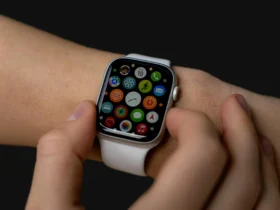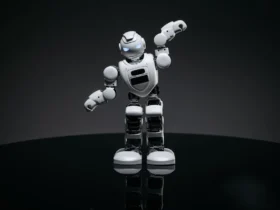Last Updated on December 6, 2024 by Daniele Lima
In recent years, artificial intelligence (AI) has infiltrated many sectors, bringing innovations that transform our daily lives. One of the areas that benefited most from this revolution was health and well-being. The convergence of AI and fitness is redefining generational health, offering personalized solutions, real-time tracking, and a deeper understanding of individual needs.
In this article, we’ll explore how technology is revolutionizing the world of fitness, from apps that offer personalized workouts to wearables that monitor your every heartbeat. We explore how AI is enabling people to more effectively achieve their health goals and how this technological revolution is shaping the future of wellness.
Table of Contents
The AI Fitness Revolution: From Basic Tracking to Smart Solutions
The intersection between AI and fitness began with the growing popularity of health apps and wearables such as smartwatches and activity trackers. Initially, these devices provided basic data such as step counts, calories burned, and sleep monitoring. However, with the integration of AI algorithms, these tools have evolved into complex systems capable of analyzing data in real-time, adjusting training plans, and providing personalized feedback based on the individual needs of each user.
AI, powered by Big Data, has the ability to analyze large volumes of information about the user’s behavior and physical state. By combining this data with known health patterns, AI can predict health problems, suggest adjustments to diet and exercise, and even warn about potential injuries before they happen. This development allows the user to not only follow an exercise routine but also understand the impact of these activities on their body, adjusting as necessary to optimize results.
The AI Fitness Revolution: From Basic Tracking to Smart Solutions
Explore how AI is transforming the fitness industry, providing smarter, more personalized solutions.
| Aspect | Description |
|---|---|
| Evolution of Fitness Tools | Wearables initially focused on tracking steps and calories. With AI, they now provide real-time data analysis and personalized plans. Learn more at CNET’s AI and Fitness Guide. |
| Big Data and Personalized Health | AI analyzes user health metrics, optimizes routines, and prevents injuries. Read more on Big Data and fitness innovations at Healthline’s AI Fitness Overview. |
Personalized Fitness: How AI Breaks the One-Size-Fits-All Workout Myth
One of the biggest benefits of AI in fitness industry is the ability to provide mass personalization. Traditionally, training programs and diets have been generalized, often ignoring individual needs and limitations. Using AI, each person can utilize a personalized fitness plan that takes into account their unique characteristics, such as age, weight, activity level, medical history, and specific goals.
Apps like Freeletics and Fitbit are at the forefront of this revolution, using AI to create dynamic training plans that adapt to users’ progress. AI monitors performance, adjusts training intensity, and suggests modifications to avoid plateaus or injuries. This not only improves training effectiveness but also keeps users motivated while seeing faster, more tangible results.
In addition to workouts, AI also transforms personalized nutrition. Tools powered by AI can create meal plans tailored to each individual’s dietary preferences, dietary restrictions, and health goals. For example, the Lifesum app uses AI to provide personalized nutritional advice, suggesting meals that meet the user’s daily calorie and nutrient goals, taking into account their dietary preferences.
Real-Time Health Tracking: AI’s Advanced Body Monitoring Capabilities

Wearable devices, equipped with advanced sensors and artificial intelligence, have played a crucial role in the fitness revolution. These devices not only monitor the level of physical activity but also provide information about the user’s general health status. AI continuously analyzes collected data and provides real-time feedback, allowing users to instantly adjust their workouts or lifestyles.
For example, the Apple Watch uses AI to monitor vital signs such as heart rate and blood oxygenation level and can alert users to abnormalities that could indicate health problems. Additionally, these devices can analyze sleep patterns and suggest changes to nighttime habits to improve the quality of rest, which is essential for recovery and overall well-being.
This real-time monitoring capability provides a new level of body awareness, allowing people to better understand how their body reacts to various stimuli and adjustments to their daily routines. This is particularly useful for athletes and individuals looking to improve their physical performance, as AI can identify patterns that would not otherwise be discernible.
Preventing Injuries and Optimizing Recovery with AI Fitness Technology
AI not only helps with personalization and real-time monitoring but also plays a key role in injury prevention and optimized recovery. AI-powered virtual trainers can identify signs of fatigue and overwork before they turn into serious injuries. They do this by analyzing how the body moves during exercise, detecting irregular patterns that indicate an increased risk of injury.
For example, US startup Kaia Health’s AI Coach app uses computer vision and AI to analyze a user’s posture and movements during exercise, providing real-time corrections. This is especially useful for those who practice impact exercises or activities that require specific techniques, such as weight lifting or running. By correcting form and technique, AI not only prevents injuries but also improves training effectiveness.
In addition to prevention, AI is also revolutionizing post-workout recovery. AI-powered apps and devices can recommend personalized recovery protocols, such as stretching techniques, massages, and even suggestions for improving sleep quality. This ensures that muscles recover properly, minimizing the risk of future injuries and improving overall performance.
The Future of AI in Fitness: Revolutionizing Personal Health Ecosystems
As AI continues to evolve, the future of fitness looks bright. The combination of personalization, real-time monitoring, and injury prevention creates a health and wellness ecosystem that is more effective, accessible, and tailored to individual needs. With AI, it’s not just about following an exercise routine, but taking a holistic approach to well-being that takes into account all aspects of health – physical, mental, and emotional.
Future advancements could include even more sophisticated AI that incorporates emotional intelligence to help users manage stress and motivation, as well as fitness programs that automatically adapt to the environment and health conditions in real-time. AI can also play a greater role in democratizing fitness, making advanced tools and resources available to a wider audience, regardless of geographic location or financial situation.
Personalized Fitness AI Potential Calculator
Discover how AI can revolutionize your workouts. Get a fitness tech roadmap tailored to your goals.
Conclusion: Technology-Driven Wellness Through AI Fitness Innovations
The AI revolution in the fitness world is just beginning. By combining advanced technology with a deep understanding of the human body, AI is transforming the concept of health and well-being. With personalization, real-time tracking, and injury prevention, we are entering a new era where fitness is not just a goal, but an ongoing, adaptive journey. Those who embrace this technological revolution will be at the forefront of a movement that promises to redefine what it means to live a healthy, balanced life.
Ai in fitness – FAQ:
How does AI actually improve fitness tracking?
Ai in Fitness analyzes your personal data, adapts workout plans, tracks progress in real-time, predicts potential health issues, and provides personalized recommendations based on your unique body and goals.
Are AI fitness apps accurate?
Modern AI in fitness apps uses advanced algorithms and machine learning to provide increasingly accurate recommendations. However, they should complement, not replace, professional medical advice.
Can AI help prevent workout injuries?
Yes! Ai in fitness can analyze movement patterns, detect potential injury risks, provide real-time form corrections, and suggest personalized recovery techniques.
Are AI fitness tools expensive?
Prices vary. Many apps offer free basic versions, with premium features available at different price points. Wearables range from affordable to high-end options.
What type of data do AI fitness tools collect?
Typically Ai in fitness, they collect heart rate, movement patterns, sleep quality, calories burned, exercise performance, and sometimes nutritional intake.









Leave a Reply